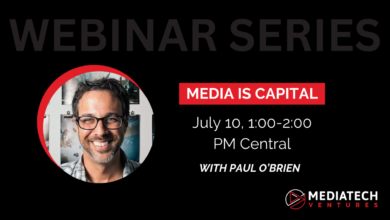Putting Our Creative Class to Work Through Technology

STEM. STEAM. Big data. AI. AR. VR. IoT. Blockchain. Today’s biggest technology buzzwords are words that people claim to understand, with their implications on employment and economic development. The repercussion of ignorance is ostracization from the very community that is leading the way toward the promise land of the next wave of jobs, or commonly known as the Fourth Industrial Revolution. Sounds pretty bleak, right?
 Thankfully, the transparent audience at the recent speaker panel, “Putting Our Creative Class to Work Through Technology,” hosted by The Austin Forum on Technology and Society, did not fake the funk and readily admitted to not really knowing what blockchain really means or does when asked by host, Paul O’Brien, founder of MediaTech Ventures (and that’s OK, as many of us don’t!). That’s the first step toward a truly holistic technology-driven future: Acknowledging gaps and identifying experts and resources that can make those connections is the path toward the aforementioned creat-tech promise land.
Thankfully, the transparent audience at the recent speaker panel, “Putting Our Creative Class to Work Through Technology,” hosted by The Austin Forum on Technology and Society, did not fake the funk and readily admitted to not really knowing what blockchain really means or does when asked by host, Paul O’Brien, founder of MediaTech Ventures (and that’s OK, as many of us don’t!). That’s the first step toward a truly holistic technology-driven future: Acknowledging gaps and identifying experts and resources that can make those connections is the path toward the aforementioned creat-tech promise land.
“Data is the new oil.”
Kalinda Howe, Office Manager of Operations and Culture at Condé Nast in Austin, reinforced the importance and unique collision of head and heart by combining creatives and technologists to challenge the expectations of next generation technology and user experiences. And, surprisingly, the two professional factions are more similar than different, with both strong in problem solving, critical thinking, curiosity, collaboration, effective communication and an unwavering desire for a tangible end product.
 These shared strengths can help shrink the divide when breaking into technology. In fact, The Future of Jobs Report, by the World Economic Forum, lists those as the top skills required to excel in 2020. That’s only 2 short years away.
These shared strengths can help shrink the divide when breaking into technology. In fact, The Future of Jobs Report, by the World Economic Forum, lists those as the top skills required to excel in 2020. That’s only 2 short years away.
You might be thinking, “Great, I have those skills, I’m prepared for the future! I’ll be successful.”
All true, but how those skills combine with functional expertise or perceived weakness, will be the bigger determinant of success. The key is to understand your own personal path toward growth in relation to tech driven employment opportunities.
“Even the CMO will need to be a Data Scientist,” said Patrick McGarry, Head of Community at Data.World. “Data is the new oil,” he continued, with both being the most valuable when refined. The skills of 2020 filter the details of the data through context and relevance, as data can not stand alone.
“Own your path and don’t wait for someone to tell you where you should lead your craft and career.”
 So what does this mean for the creative community? The non-technical professionals? The artists? Own your path and don’t wait for someone to tell you where you should lead your craft and career.
So what does this mean for the creative community? The non-technical professionals? The artists? Own your path and don’t wait for someone to tell you where you should lead your craft and career.
Jim Spencer, founder of the short-form video news network Newsy, started the Forum’s panel of guests and noted that it’s a matter of preparing for the opportunities, “Ask where learning ranks as a priority. Consider if innovation is desired or required. And be willing to listen and learn.”
Talk to people in the know. Network with established professionals who aren’t only studying the trends, but making them. Join meet-ups within a field of interest to learn more and understand your options for up-leveling your skills. As a tech-focused city, Austin has many free groups ranging in topics and levels of sophistication. Here are a few great places to start:
Talk to a colleague in a different department where you’d like to move into, ask a mutual connection for coffee. Learn about what they’re working on, where they see their role or industry moving toward, and what skills are desirable. Networking can be awkward, but doesn’t have to be when you share a passion.
Use professional social networking sites like LinkedIn, which recently launched in limited release a new Mentor Match application, to find a mentor who can steer your career choices toward the growth and development you want.
Then, use some of the top job search platforms like Hired, Indeed and Dice, to identify your target list of companies, job titles and qualifications.
Engage in local community resources. There are a number of programs available, both locally and online, that can accelerate learning new technical skills. Austin, as the Forum was discussing, has varying options, from boot camp style classes to full university accreditation. What makes these options so valuable is they’re homegrown and cater to the local market, helping you be better equipped to make the best choice on where and how you grow your career and skills.
Be open to possibilities. Creatives generally love or abhor technology, but by understanding the natural extensions of your strengths and where they can be parlayed into roles of the future is critical. By staying focused on your path, testing (and occasionally, failing at) new skills, you will remain open to new opportunities that didn’t exist. Just remember, it’s only been 10 years since the beautifully designed iPhone changed smart phones forever.
Stay curious and keep learning. Take a peek at the slides from The Austin Forum on Technology & Society exploring how we better support our Creative Class in their work, through technology:






